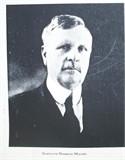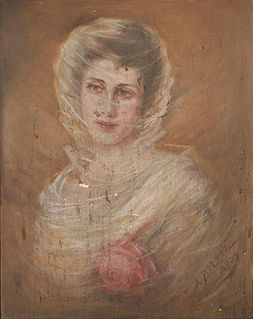
William Gannaway "Parson" Brownlow was an American newspaper publisher, Methodist minister, book author, prisoner of war, lecturer, and politician who served as the 17th Governor of Tennessee from 1865 to 1869 and as a United States Senator from Tennessee from 1869 to 1875. Brownlow rose to prominence in the late 1830s and early 1840s as editor of the Whig, a polemical newspaper in East Tennessee that promoted Whig Party ideals and opposed secession in the years leading up to the American Civil War. Brownlow's uncompromising and radical viewpoints made him one of the most divisive figures in Tennessee political history and one of the most controversial Reconstruction Era politicians of the United States.

Lookout Mountain is a mountain ridge located at the northwest corner of the U.S. state of Georgia, the northeast corner of Alabama, and along the southeastern Tennessee state line in Chattanooga. Lookout Mountain was the scene of the 18th-century "Last Battle of the Cherokees" in this area during the Nickajack Expedition. On November 24, 1863, during the American Civil War, the Battle of Lookout Mountain took place here.

Newell Sanders was a Chattanooga businessman who served for a relatively brief time as a United States Senator from Tennessee.

William Crutchfield was an American politician who represented the 3rd congressional district of Tennessee in the United States House of Representatives for one term (1873–1875). He also served several terms as an alderman in his adopted hometown of Chattanooga, where he was a prominent figure and businessman. A Southern Unionist, he garnered regional fame and notoriety in January 1861 when he engaged in a heated debate with future Confederate States president Jefferson Davis at his family's Chattanooga hotel.

James Stewart Martin was a U.S. Representative from Illinois.

Charles McClung McGhee was an American industrialist and financier, active primarily in Knoxville, Tennessee, in the latter half of the nineteenth century. As director of the East Tennessee, Virginia and Georgia Railway (ETV&G), McGhee was responsible for much of the railroad construction that took place in the East Tennessee area in the 1870s and 1880s. His position with the railroad also gave him access to northern capital markets, which he used to help finance dozens of companies in and around Knoxville. In 1885, he established the Lawson McGhee Library, which was the basis of Knox County's public library system.

Gustavus Hindman Miller (1857–1929) was a prominent merchant, manufacturer, financier, capitalist farmer, author and public spirited citizen of Chattanooga, Tennessee.

Francis Marion Walker was a Confederate States Army officer during the American Civil War. He was killed while commanding a brigade at the Battle of Atlanta of July 22, 1864, one day before his commission as a brigadier general in the Confederate Army was delivered.

Adelia Armstrong Lutz was an American artist active in the late nineteenth and early twentieth centuries. She organized art circles in Knoxville, Tennessee, as director of the Knoxville Art Club and as a co-organizer of the Nicholson Art League. Her still lifes and portraits were exhibited throughout the American South, and they are to be the subject of a permanent exhibit at her former home, Historic Westwood.
Milo Smith was a prominent American physician and owner of the leading medical practice in the early days of Chattanooga, Tennessee, who served as mayor of the city in three different decades.
John Preston Young (1847–1934) was an American Confederate veteran, judge and historian.
White Burkett Miller was an American lawyer from Tennessee. He served as special assistant to the Attorney General of the United States twice. He is the namesake of the Miller Center of Public Affairs at the University of Virginia.

James Williams was an American Minister Resident (Ambassador) to the Ottoman Empire, appointed on January 14, 1858 by President James Buchanan. James Williams remained in this function until the outbreak of the American Civil War, terminating his functions on May 25, 1861. A native of Tennessee, he remained in Europe supporting the Confederacy by selling Confederate bonds, as well as writing numerous articles and books in favor of the South alongside Henry Hotze in London. Accused of treason for joining the Confederate cause as a US Government employee, he remained in Europe and died in Austria in 1869.
Benjamin F. Cockrill Jr. (1866–1936) was an American farmer and politician.

Richard Thornton Wilson was a multimillionaire American investment banker known for being the father of five children who all married into prominent families during the Gilded Age of New York.
Major John Cockrill was an American settler. A veteran of the American Revolutionary War, he was one of 13 explorers to modern-day Nashville, Tennessee in 1779, and he received a land grant in modern-day Centennial Park in 1784 Cockrill Springs named for him.
John Cockrill was a Welsh-born American planter and politician. He served as a member of the House of Burgesses.

Penelope Johnson Allen, born Penelope Van Dyke Johnson, was an American newspaper columnist and local historian. In the 1930s, she led a Works Progress Administration project to collect and copy county records in Tennessee, preserving many genealogical and other records. She wrote a popular family history column for the Chattanooga Times, "Leaves of the Family Tree".

Elizabeth Fry Page was an American author and editor associated with the South. A co-founder of the Tennessee Woman's Press and Authors' Club, she served as the Poet Laureate of the Tennessee division of the Daughters of the American Revolution (D.A.R.) and that of the Tennessee Division, United Daughters of the Confederacy (UDC). She lectured on literary, musical and philosophical subjects. Coming from a long line of literary ancestors, Page's journalistic life began early, and she worked in many branches of her profession, as a journalist, magazine editor, essayist, short story writer and a producer of verse. Among her published works can be counted Vagabond Victor: Or, The Downfall of a Dog; a True Story (1908), Edward MacDowell, his work and ideals (1910), The romance of Southern journalism (1910), and A garden fantasy (1923). Page was also a veteran clubwoman.

Cornelia Deaderick Glenn was an American society hostess and temperance activist who, as the wife of Robert Broadnax Glenn, served as First Lady of North Carolina from 1905 to 1909. She was involved in the temperance movement and avidly supported her husband's 1908 Prohibition campaign that banned liquor statewide. A devout Presbyterian, she was the founder of one of Winston-Salem's first benevolent societies.












